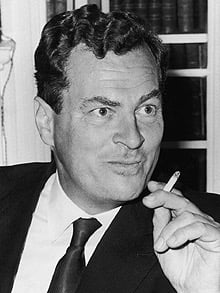Paddy Leigh Fermor
Few travelers have ever lived as wildly—and written as beautifully—as Patrick "Paddy" Leigh Fermor. At 18, he set off on foot across Europe, charming aristocrats, sleeping in barns, and drinking with shepherds along the way. Later, he became a war hero, famously kidnapping a Nazi general in Crete. His books, including A Time of Gifts and Between the Woods and the Water, capture not just the places he visited, but the sheer thrill of the journey. Part scholar, part swashbuckler, and full-time adventurer, Fermor’s life was an epic blend of history, literature, and pure, unfiltered mischief.
2/10/20254 min read


The Vagabond Scholar Who Walked Across Europe and Kidnapped a Nazi General
Some people take a gap year. Patrick "Paddy" Leigh Fermor took a gap life. At 18, he packed a rucksack, donned a tweed jacket, and set off—on foot—across 1930s Europe. No Google Maps, no budget airlines, just an insatiable curiosity, impeccable charm, and an apparent immunity to discomfort. His adventures, later immortalized in A Time of Gifts, Between the Woods and the Water, and The Broken Road, made him one of the greatest travel writers of the 20th century.
But Fermor wasn’t just a wandering romantic—he was also a war hero, polyglot, and occasional spy. Along the way, he charmed Balkan nobility, lived in monasteries, and, during World War II, orchestrated the audacious kidnapping of a Nazi general in Crete. His life was part adventure novel, part comedy of errors, and entirely extraordinary.
A Teenage Vagabond in a Pre-War Europe
Born in 1915, Paddy Leigh Fermor was an irrepressible, bookish troublemaker. Expelled from school for holding hands with a girl (scandalous!), he decided to educate himself in the best way possible—by walking from Holland to Constantinople. His book A Time of Gifts (1977) recounts the first leg of this journey in vivid, poetic detail, capturing a Europe teetering on the edge of World War II.
Dressed in second-hand aristocratic clothing—complete with breeches and a walking stick—he passed as anything from an impoverished nobleman to a lost poet. He was just as comfortable in shepherds' huts as in the grand libraries of Hungarian castles, where he was often invited to stay by bemused aristocrats charmed by his wit and enthusiasm.
One such encounter occurred at a grand estate in Transylvania, where his host, a Hungarian count, insisted he stay indefinitely. "We cannot let you leave until you have at least some proper fencing lessons," the count declared, thus delaying Paddy’s journey by weeks. (Fermor, Between the Woods and the Water, p. 134).
Fluent in Five Languages (And the Language of Mischief)
Fermor had an uncanny ability to pick up languages, which helped him slide effortlessly into different cultures. He drank with Bulgarian peasants, debated poetry with Romanian scholars, and once got into a hilarious misunderstanding with a Greek Orthodox priest who mistook him for a wandering monk due to his unkempt beard and philosophical ramblings.
During his travels through Greece, he developed a lifelong love affair with the country, later settling there and writing Mani (1958) and Roumeli (1966), both beautifully evocative books about the landscapes, traditions, and eccentric characters of Greece.
But not all his adventures were poetic—some were just plain bizarre. One of his more unusual nights involved sleeping in a barn, only to wake up to the sensation of something warm and heavy pressing on his chest. Opening his eyes, he found himself nose-to-nose with an enormous pig. In true Paddy fashion, he simply patted its head and went back to sleep. (Fermor, The Broken Road, p. 76).
World War II: The Kidnapping of a Nazi General
During World War II, Fermor’s wanderlust took a detour into espionage. He joined the British Special Operations Executive and was parachuted into Nazi-occupied Crete. His mission? To organize resistance against the Germans.
In 1944, in an operation that sounds like something out of a Hollywood script, Fermor and a small band of Cretan partisans kidnapped General Heinrich Kreipe, the German commander of the island. Disguised as Nazi soldiers, they stopped Kreipe’s car at a fake checkpoint, bundled him away, and then—because apparently, this wasn’t difficult enough—marched him over a mountain range to the coast, where a British boat whisked him to Egypt.
The most surreal moment? One night, as they camped in a cave, Kreipe, a classically educated officer, sighed and recited a passage from Horace. Without missing a beat, Fermor finished the verse. For a brief moment, captor and captive sat in silence, bonded by Latin poetry. (Fermor, Abducting a General, p. 98).
The operation was such a spectacular act of wartime cheekiness that Fermor became a national hero. The whole affair was later made into the film Ill Met by Moonlight, starring Dirk Bogarde as Fermor—a casting choice Paddy reportedly found far too flattering.
A Life of Letters (and More Adventures)
After the war, Fermor settled in Greece, where he continued writing, drinking copious amounts of wine, and hosting an endless stream of guests at his idyllic home in Kardamyli. His books, particularly A Time of Gifts, are celebrated not just for their descriptions of travel but for their deep historical insights, linguistic richness, and sheer joy in the world.
Despite his refined literary style, he never lost his knack for getting into strange situations. Once, while staying in a Greek monastery, he was awakened in the night by an enormous crash. Rushing outside, he found that a group of drunken monks had stolen a farmer’s donkey and were attempting to teach it how to dance. Fermor wisely decided to leave before being implicated in the crime. (Fermor, Roumeli, p. 211).
The Last Romantic Vagabond
Paddy Leigh Fermor’s life reads like an epic novel—a mix of The Odyssey, The Great Gatsby, and Mission: Impossible. He was a scholar, a poet, a soldier, and above all, an adventurer. Whether he was wandering through medieval Europe, sipping ouzo with Greek fishermen, or staging one of the most daring wartime heists in history, he did everything with wit, style, and an irrepressible love for life.
His books remain some of the finest travel literature ever written, capturing not just places, but the magic of the journey itself. Fermor didn’t just travel—he immersed himself in cultures, forging deep connections and leaving behind stories that are as hilarious as they are inspiring.
If there’s a lesson in Paddy’s life, it’s this: pack light, keep your mind open, and never turn down an invitation to a fencing lesson in Transylvania.
